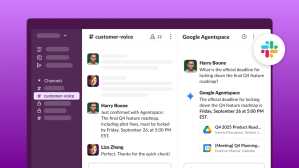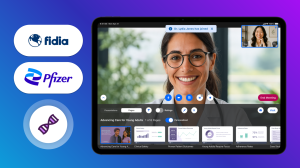Key Takeaways
- Generative AI has unleashed exciting new opportunities for workers across IT, marketing, sales, and service. Salesforce’s generative AI research, highlighted in this article, reveals how these roles are using the technology, why they’re not, and much more to help businesses prepare for the future.
Editor’s Note: This story was updated in February 2025 to keep it fresh.
Generative artificial intelligence is on nearly everyone’s mind – and Salesforce has the stats to prove it.
In addition to Salesforce executives giving a primer on generative AI and sharing predictions about its effect on the future of sales, small businesses, and CRM, the company has spent months researching trends and worker sentiment about the new technology.
Salesforce’s Generative AI Snapshot Research Series, an ongoing study of over 4,000 full-time workers across industries, reveals the power of and perspectives on generative AI across IT, marketing, sales, and service – and an additional study among over 4,000 general population adults across the U.S., UK, Australia, and India.
For a comprehensive look at industry and generative AI research, visit the Salesforce Stat Library. For industry-specific insights on generative AI, click the relevant section below:
General population data reveals new insights
Salesforce’s most recent survey on generative AI use among the general population within the U.S., UK, Australia and India found the public is split between users and non-users. Within each country, the online populations surveyed reported the below usage (note: cultural bias may impact results):
- 73% of the Indian population surveyed is using generative AI.
- 49% of the Australian population surveyed is using generative AI.
- 45% of the US population surveyed is using generative AI.
- 29% of the UK population surveyed is using generative AI.
Notably, the research uncovered AI users are “super-users” – meaning the majority of them use the technology frequently and believe they are well on their way to mastering it.
- 65% of generative AI users are Millennials or Gen Z, and 72% are employed.
- Nearly 6 in 10 users believe they are on their way to mastering the technology.
- 70% of Gen Z report using the technology and 52% of them trust the technology to help them make informed decisions.
- 52% say they use generative AI more now than when they first started.
These early adopters are also looking to expand generative AI use cases from fun and games to workplace and enterprise applications:
- 75% of generative AI users are looking to automate tasks at work and use generative AI for work communications.
- 38% of generative AI users use generative AI for fun/messing around, and 34% for learning about topics that interest them.
Not everyone is sold on AI just yet – and it tends to fall along generational lines. While AI users are young and engaged, non-AI users are older, less familiar with the technology, and more skeptical of its benefits:
- 68% of non-users are Gen X or Baby Boomers.
- 88% are unclear about how generative AI will impact their life.
- 40% say they aren’t familiar enough with the technology and 32% say the technology is not useful for them.
More cautious than early adopters, non-users are holding out for more safety, education, and more integration in their lives before they experiment with generative AI:
- 70% of non-users would use generative AI more if they knew more about the technology.
- 64% would use generative AI more if it was more safe/secure.
- 45% would use generative AI more if it was integrated into the technology they already use.
Desk worker perceptions of generative AI
Workers are of two minds when it comes to generative AI, Salesforce research reveals. While they see the benefits of generative AI, they are also concerned about navigating the risks and learning the skills needed to take full advantage of the quickly evolving technology.
- Three out of five workers (61%) currently use or plan to use generative AI.
- More than two out of three (68%) say generative AI will help them better serve their customers.
- Two out of three (67%) say generative AI will help them get more out of other technology investments, like other AI and machine-learning models.
However, many workers don’t yet know how to use generative AI responsibly. Half of the workers surveyed (54%) said they worry generative AI outputs are inaccurate, and 59% worry the outputs are biased.
- Nearly three-quarters of respondents (73%) believe generative AI introduces new security risks.
- Of those who said they plan to use generative AI, almost 60% said they don’t know how to do so using trusted data sources or while ensuring sensitive data is secure.
Trust is a marker to using and understanding generative AI
- Workers who trust AI are more than twice as willing to use generative AI at work
- Workers who trust AI are 4x more likely to know how it is implemented, used and governed in their business
- Nearly half (49%) of workers who trust AI say they themselves are responsible for building their own trust in generative AI
Business leaders also appeared to overestimate their ability to use generative AI responsibly. Salesforce’s research showed most C-suite leaders (83%) claim they know how to use generative AI while keeping data secure — compared to only 29% of individual contributors.
Clearly, companies have a gap to close when it comes to ensuring generative AI is effectively adopted and used. Fortunately, the data offers some insight. When asked how to establish generative AI as a trusted technology, employees identified four key elements to successfully using it in their role:
- Human oversight (60%)
- Enhanced security measures (59%)
- Trusted customer data (58%)
- Ethical use guidelines (58%)
IT professionals see vast opportunity in generative AI
Salesforce’s latest State of IT report found that 86% of IT leaders expect generative AI to soon play a prominent role at their organizations. And, the company’s March survey of 500 IT decision makers revealed that most (57%) believe generative AI is a “game changer.”
- 67% of IT leaders surveyed said they have prioritized generative AI for their business within the next 18 months.
- 33% said it was a top priority.
Alongside the enthusiasm, the March survey respondents were nearly unanimous (99%) in saying their business must take measures to use generative AI responsibly, and most senior IT leaders said their organization is not ready to deploy it.
Nearly two in three respondents (65%) said they can’t justify implementing generative AI yet. IT decision-makers cited several barriers to using generative AI, including:
- Generative AI will introduce new security threats to their data (71%).
- Their employees lack the skills to use it successfully (66%).
- Generative AI can’t yet integrate with their business’s tech stack (60%).
- Their organization lacks a unified data strategy (59%).
Marketers believe generative AI will transform their role but worry about accuracy
Despite how generative AI’s relatively new status as a mainstream technology, half (51%) of the over 1,000 marketers Salesforce recently surveyed are already using it or are experimenting with it at work. Another 22% of respondents said they plan to use generative AI soon – which, if that pans out, would mean nearly three out of four marketers surveyed could be using it today.
The most common use of generative AI among marketers is:
- Basic content creation (76%)
- Writing copy (76%)
- Inspiring their creative thinking (71%)
- Analyzing market data (63%)
- Generating image assets (62%)
Marketers also believe generative AI will transform their role, freeing them up to focus more on strategic work:
- Seven in 10 marketers (71%) expect generative AI will help eliminate busy work and allow them to focus more on strategic work.
- They also predict generative AI will save them five hours of work per week – which amounts to over a month per year.*
Not without their reservations, marketers ranked accuracy and quality as the top concern among marketers (31%), followed by trust (20%), skills (19%), and job safety (18%).
Salesforce’s research also shows that many marketers need training to make the most of generative AI.
- 39% of marketers don’t know how to use generative AI safely.
- 43% said they don’t know how to get the most value out of it.
- 54% believe generative AI training programs are important for successfully using it in their role.
- Despite that, 7 in 10 marketers said their employer does not yet provide generative AI training.
Generative AI Snapshot Series
Uncover generative AI insights from over 4,000 full-time workers across the US, UK, Australia and India on Tableau.
Salespeople say generative AI will help sell more efficiently
While only about one-third of salespeople surveyed said they used or planned to use generative AI – compared to 51% of marketers – 61% of sales pros said they believe generative AI will help them better serve their customers. The same percentage of sellers also said they believe generative AI will help them sell more efficiently.
Salesforce research found that the skills gap may be affecting sales reps in two ways: It could be holding them back from adoption and instilling fears over job security.
- Most sellers, 53%, said they do not know how to get the most value from generative AI at work.
- Just under half said they do not know how to safely or effectively use generative AI – 49% and 47%, respectively.
- Almost two out of five sales professionals (39%) worry they will lose their job if they don’t learn how to use generative AI at work.
Despite salespeople’s relative hesitance to use generative AI, the technology has already proven successful for early adopters. Of the respondents currently using it, 84% said it helped increase sales at their organization by enhancing and speeding up customer interactions.
- Sales professionals are most likely to use generative AI to help with:
- Basic content creation (82%)
- Analyzing market data (74%)
- Automating personalized sales communications (71%)
- Sellers expect generative AI will transform their roles by:
- Helping to generate sales reports (51%)
- basic content creation (48%)
- Analyzing market data (47%)
Service professionals think generative AI will help them serve customers faster
Among the workers surveyed in Salesforce’s research series, service professionals were the least likely to be using generative AI.
- Just 24% of customer service said they were using generative AI for work.
- Only 15% said they plan to use generative AI in the future.
Like sales pros, the skills gap may be behind service workers’ low adoption rate.
- Three out of five service workers (60%) said they do not know how to get the most value out of generative AI at work.
- Just over half of respondents said they do not know how to use the technology effectively or safely at work, 55% and 54%, respectively.
Despite the hesitance to use generative AI, nearly half of the surveyed service professionals (48%) worry they will lose their job if they don’t learn how to use the technology. However, of the service professionals currently using generative AI, 9 out of 10 say it helps them serve customers faster.
Service workers using generative AI were remarkably consistent in how they are applying the technology. Salesforce’s research found the leading generative AI uses among service professionals are:
- Basic content creation (68%)
- Create and personalize service communications with customers (68%)
- Better automate customer service communications (67%)
They were similarly consistent in how they think generative AI will transform customer roles:
- 48% of service professionals said generative AI will improve customer self-service options.
- 47% said it will help automate customer service communications better.
- 46% said it would help analyze service data.
Key takeaways
Though each industry has unique use cases and perspectives around generative AI, several throughlines have emerged across Salesforce’s generative AI research:
- Workers largely see the potential benefits of generative AI, with the potential for saving time spent on busy work to driving better customer experiences and increasing revenue.
- Data security, accuracy, and trust in generative AI are points of concern among workers and needed to use the technology at work successfully.
- Most respondents say their employers are not offering the training they need to adopt generative AI.
“We ask ourselves daily, what can our customers solve with AI?” said Clara Shih, CEO of Salesforce AI. “For example, in marketing, it’s using AI to identify audience segments and auto-generate landing page images and copy. In sales, it’s summarizing key account changes and auto-generating prospecting emails that compel customers to open and respond. In customer support, it’s auto-generating case summaries and knowledge articles following a successful issue resolution. And for developers, it’s auto-generating test cases, comments, and even the code itself.”
She continued, “The business value comes from driving efficiency as well as consistently higher quality by augmenting every employee at every turn.”
Go deeper
- For a full look at Salesforce’s industry research, visit the Stat Library
- Find out how generative AI can help small businesses sell smarter
- Learn the ABCs of AI with the generative AI glossary for business leaders here
- See what generative AI means for CRM
*(5 hours per week on average saved using ‘generative AI’ x 52 weeks in one year) / 8-hour working day = 32.5 days or over a month per year saved on average

















